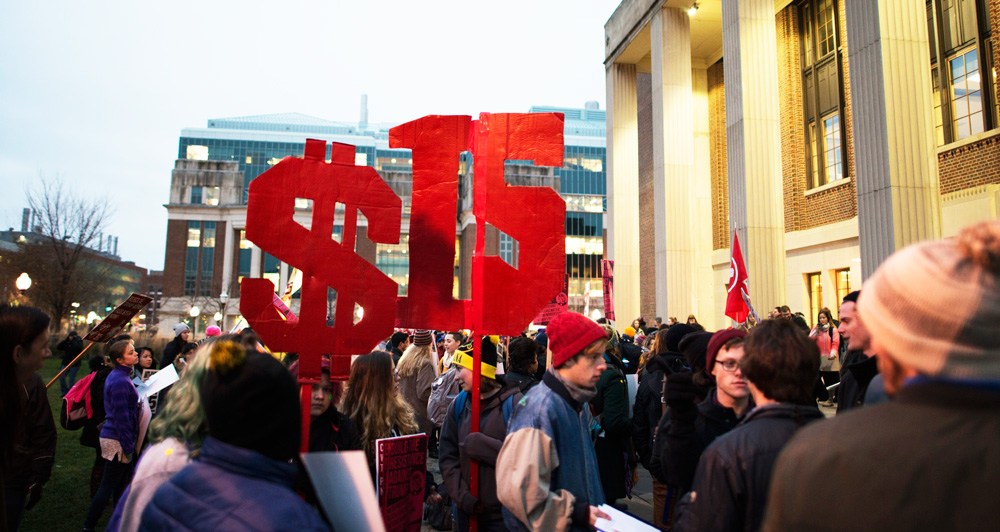
As Target races against Walmart to voluntarily raise its minimum wage to $15 per hour, we’re reminded that upward fluctuations in the price of low-skilled labor are more than possible without the blunt interference of government control (and its deleterious side effects).
Even still, critics will predictably proclaim that such changes are far too little, too late, arguing that the government plays a valuable role in accelerating these developments when employers fall short.
Or, as one of economist Don Boudreaux’s graduate students recently put it: “Isn’t it true that employers sometimes have enough power to keep pay too low for workers?” In such instances, surely government has answers.
Yet such a perspective requires us to believe that the government has far more knowledge and foresight than it actually has, which results in giving it far more power than it deserves. As Boudreaux aptly reminds us: “Government isn’t god.”
Of course reality is riddled with individual situations, spread out across locales and time, when wages for some workers could be forced up by an all-knowing god without inflicting harm on any of those workers – that is, with all of the costs of the higher wages paid for by their currently too-powerful employers. Reality is also, no doubt, riddled with individual situations in which wages are, by the same standard of perfection, too high: in such situations god could force down the wages of those currently too-powerful workers and thereby improve the economic welfare of employers and consumers. Indeed, reality is riddled with all manner of imperfections that god could correct in order to increase human welfare.
But government isn’t god. Government possesses neither god’s omniscience nor god’s benevolence. If government is not to be a tool of special interests and tyrants, it must be constituted to operate, not as we would want a benevolent superior being to govern us, but as a rule-bound agent. And one rule that has repeatedly proven its worth is that prices and wages set on markets – especially on markets in which there are no government-erected barriers to the entry of either sellers or buyers – work over time far better than government-set or constrained prices and wages to improve the lives of market participants, including workers.
This is typically where the debate stops or stays: arguing over the merits of an all-knowing government vs. all-knowing employers.
But if government isn’t god, and if corporations and business owners aren’t gods, is there anything we can do to pursue a “proper price” or a “just wage”? Is our only option to simply “let the market work”?
Throughout all of this, we should remember that “market signals” are simply signals, the discernment of which requires wisdom, human conscience, and, for Christians, fellowship with our Creator. When we think about the intersection of work and wages, “listening to the market” is simply a starting point.
In Work: The Meaning of Your Life, theologian Lester DeKoster explores these “twin tracks” of work and wage, noting that the proper bridge will not be built by arbitrary government edict, but by the art of “executive stewardship,” driven by God-given responsibility and God-directed conscience. “Work and wage draw together at the point where conscience functions,” he writes, “that is to say, work and wage tracks coalesce in persons making executive decisions.”
When we inhibit the freedom of the human conscience, an inhibition of the economic order is sure to follow.
Those who set wages have an “awesome obligation,” DeKoster writes, and their consciences must balance a host of factors — similar to those mentioned by Boudreaux — each pushing toward a variety of goals, including (1) the best product, (2) the best working conditions, (3) the best wage for everyone involved, and (4) “reflecting the best efforts at every job, to be sold at the lowest price compatible with the requirements.”
“As Christian business owners and wage-setters, we may not be ‘gods,’ but we’d do well to heed transcendent signals, whether through basic ethics or human conscience or active prayer or spiritual discernment.” As DeKoseter explains:
The twin tracks of work and wage do not meet, and cannot be scientifically related. They are bridged by morality, not by mathematics. And it is in the self-sculpting choices of wage and price scales that managers must make the twin tracks merge — under the all-seeing eye of God. It is here that justice, as defined by the will of the Creator and revealed in his Word, comes to bear upon the economy.
The executive who seeks to avoid responsibility for his choices by seeming to let the market, or what the traffic will bear, or what necessity will oblige employees to accept become his conscience is in fact putting his choices in the service of idols—and idolatry is no more acceptable to God in board rooms and executive suites than it is in the shadowed temples of paganism. Setting wages and prices, while keeping an industry or business sound and healthy, is far from easy. Failures occur. But conscience sets before managerial executives the goal of the ideal sketched above, challenging them to make their wage and price decisions with an eye fixed on justice. Such decisions sculpt selves destined for beatitude.
For Christians, our focus has to remain on the bigger picture — economic, social, spiritual, and otherwise — and that task requires freedom, properly understood. As we fight for the same freedoms as Boudreaux, let’s remember that whatever victories we achieve are where active and attentive “executive stewardship” actually begins.
Photo: Rally demanding $15/hr minimum wage, Fibonacci Blue, (CC BY 2.0)

